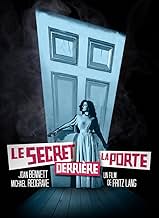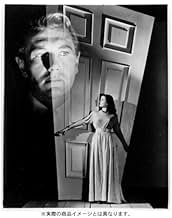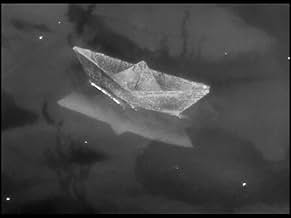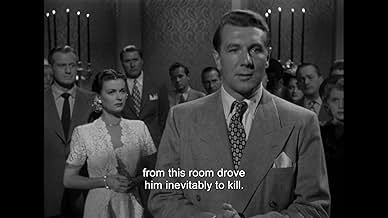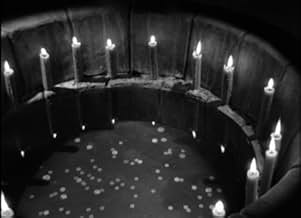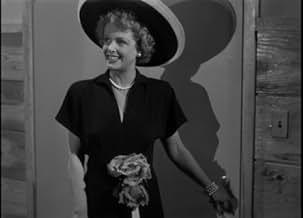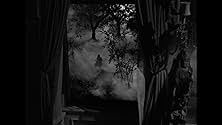VALUTAZIONE IMDb
6,6/10
6158
LA TUA VALUTAZIONE
Una bella donna e il suo nuovo marito si stabiliscono in un'antica villa sulla costa orientale.Una bella donna e il suo nuovo marito si stabiliscono in un'antica villa sulla costa orientale.Una bella donna e il suo nuovo marito si stabiliscono in un'antica villa sulla costa orientale.
Robert Barber
- Altar Boy
- (non citato nei titoli originali)
Ray Beltram
- Townsman
- (non citato nei titoli originali)
Virginia Brissac
- Sarah
- (non citato nei titoli originali)
Ralph Brooks
- Guest in Home Tour
- (non citato nei titoli originali)
Albert Cavens
- Guest in Home Tour
- (non citato nei titoli originali)
Tom Chatterton
- Judge
- (non citato nei titoli originali)
David Cota
- Small Mexican Knife Fighter
- (non citato nei titoli originali)
Frank Dae
- Country Squire
- (non citato nei titoli originali)
Recensioni in evidenza
The Secret Beyond the Door is Fritz Lang's melodramatic suspense tale that seems to have taken more than it's fair share of influence from Alfred Hitchcock's Rebecca. Before the story even starts, we're waiting to find out one thing - what's the secret? This somewhat puts the movie on the back foot from the start, as all that we see is build up to the big finale, which basically means that the pay off has to be pretty good otherwise the whole film will fall apart. The final twist, in fact, doesn't really do the build up justice; but it's not absolutely terrible, and I would still rate this film as at least 'good', but just don't tune in expecting anything brilliant. This is certainly no 'M', for example. The plot follows a young woman that goes on holiday and meets a charming middle-aged man. The two later get married and she accompanies him back to his house where she meets his son, and finds his collection of rooms, one of which is kept locked up. What is the secret beyond the door...?
Fritz Lang's bleak cinematography and haunting use of music help to create the atmosphere that a story of this nature needs in order to work effectively. The focus on the door helps to create the tension as to what the secret is throughout the movie, and Fritz Lang seems keen to capitalise on that as we see Joan Bennett's narration change from how she feels personally to driving herself crazy as she tries to decipher what's behind the door. The characters in the story are interesting, and they need to be as this film is mostly character based. We follow Celia Lamphere, and we are given her thoughts by way of the aforementioned narration. Narration is often found in scripts that have been written by people that don't know how to write good scripts. However, in this case it actually helps the film to move along. In order for the story to work, we need to know what the character is feeling, so in this case narration is helpful to the story.
As I've mentioned, the ending isn't all that good, but the suspense builds nicely and there's much to like about this film. If you're new to Fritz Lang, though, I certainly recommend the classics 'M' and 'Metropolis' before this, and also from his American films; 'Fury', 'Scarlet Street', 'Beyond a Reasonable Doubt' and 'While the City Sleeps' get my thumbs up.
Fritz Lang's bleak cinematography and haunting use of music help to create the atmosphere that a story of this nature needs in order to work effectively. The focus on the door helps to create the tension as to what the secret is throughout the movie, and Fritz Lang seems keen to capitalise on that as we see Joan Bennett's narration change from how she feels personally to driving herself crazy as she tries to decipher what's behind the door. The characters in the story are interesting, and they need to be as this film is mostly character based. We follow Celia Lamphere, and we are given her thoughts by way of the aforementioned narration. Narration is often found in scripts that have been written by people that don't know how to write good scripts. However, in this case it actually helps the film to move along. In order for the story to work, we need to know what the character is feeling, so in this case narration is helpful to the story.
As I've mentioned, the ending isn't all that good, but the suspense builds nicely and there's much to like about this film. If you're new to Fritz Lang, though, I certainly recommend the classics 'M' and 'Metropolis' before this, and also from his American films; 'Fury', 'Scarlet Street', 'Beyond a Reasonable Doubt' and 'While the City Sleeps' get my thumbs up.
I enjoyed it much more the second time around. At first it was far too unbelievable. It hardly made any sense then and I never felt I cared what happened. I bought the video because of Joan Bennett and Fritz Lang making another film noir. Now when i saw it, I loved it and just sat back enjoyed all the hokus-pokus fluff that is delivered quite seriously. It´s supposed to be like "Rebecca" and that´s why I didn´t like it the first time. Too many plot holes! There´s even an exotic ms. Danvers type around with a veil...Too much!
Why would Joan marry and stay with someone so utterly stiff and charmless as Michael Redgrave?? The male lead should have been given to someone more mysterious and attractive. They were hoping for a new Laurence Olivier...
Joan is a treat as always. I love how she comes across as a spoiled debutante who can hardly care to utter her lines with any conviction. She´s a good actress -just a bit too laid back at times. I love her, she is so stunningly beautiful and cool in her Hollywood wardrobes.
I love the whole atmosphere of the movie. It´s slow at first and then from the honeymoon in Mexico and forward so mysterious! I love her bedroom with the tapestry! The thing with the room-collecting was quite farfetched but fun. Who would REALLY aquire complete scenes of murders at home???? I´m going to see it again soon and learn some lines. They don´t make them like they used to!
Why would Joan marry and stay with someone so utterly stiff and charmless as Michael Redgrave?? The male lead should have been given to someone more mysterious and attractive. They were hoping for a new Laurence Olivier...
Joan is a treat as always. I love how she comes across as a spoiled debutante who can hardly care to utter her lines with any conviction. She´s a good actress -just a bit too laid back at times. I love her, she is so stunningly beautiful and cool in her Hollywood wardrobes.
I love the whole atmosphere of the movie. It´s slow at first and then from the honeymoon in Mexico and forward so mysterious! I love her bedroom with the tapestry! The thing with the room-collecting was quite farfetched but fun. Who would REALLY aquire complete scenes of murders at home???? I´m going to see it again soon and learn some lines. They don´t make them like they used to!
Rather tepid 1940s thriller. Joan Bennett is beautiful, however, as is the cinematography. Really strikingly shot, which makes it well worth watching; it is reminiscent of Spellbound in parts, with a surreal edge to some of the backdrops.
The story, very loosely based on the old Bluebeard fairy tale, is interesting, but the pacing of the film is off, and you never really feel much tension. There are some interesting characters in the house, especially the secretary, but they aren't very developed. So much more could have been done in this area, to make it a truly great film.
Without giving anything away, I doubt many of us would have made the same decision that the main characters did in the end. But don't let that distract you from the truly beautiful fashion of this film.
The story, very loosely based on the old Bluebeard fairy tale, is interesting, but the pacing of the film is off, and you never really feel much tension. There are some interesting characters in the house, especially the secretary, but they aren't very developed. So much more could have been done in this area, to make it a truly great film.
Without giving anything away, I doubt many of us would have made the same decision that the main characters did in the end. But don't let that distract you from the truly beautiful fashion of this film.
Celia Barrett is a New Yorker with a trust fund and one of the city's most eligible single women. On a trip to Mexico she meets and falls for the charming Mark Lamphere, and later the couple marry. Returning to his home and pushing him to let her finance his passion for collecting "rooms", Celia starts to suspect that all might not be right with this perfect man she has landed and indeed the secrets in his house and in his past soon start to mount.
I watched this on the back of positive reviews from a couple of people on this site; perhaps I should have read further though because I didn't find the wonderfully intelligent noir that they claimed to have seen. Perhaps these commentators have not seen the film Rebecca which sort of covers similar themes but does it much, much better than this film does, but for me I found it hard to care about this. Visually I liked it and credit to Lang because his direction and work with his cinematographer does produce some really well set up scenes that do have great atmosphere. However this is not repeated in the material which is not as intelligent as it would like to think itself. Indeed it is terribly overwrought and melodramatic and offers little to counter it.
As a result the cast have to thanklessly play it up the best they can. I thought than Bennett did as good a job as she could have hoped to have done. She isn't brilliant though but she plays detective well. More important but not much cop is Redgrave; OK the blame lies more on the material than in his performance but given how little was conveyed by words at times, his performance was important but not up to the task.
Overall then, a fairly overdone melodrama that doesn't really convince in how it uses psychoanalysis to inform and direct its narrative. It may look great but the substance just isn't there from the start right down to the insultingly simplistic final scene.
I watched this on the back of positive reviews from a couple of people on this site; perhaps I should have read further though because I didn't find the wonderfully intelligent noir that they claimed to have seen. Perhaps these commentators have not seen the film Rebecca which sort of covers similar themes but does it much, much better than this film does, but for me I found it hard to care about this. Visually I liked it and credit to Lang because his direction and work with his cinematographer does produce some really well set up scenes that do have great atmosphere. However this is not repeated in the material which is not as intelligent as it would like to think itself. Indeed it is terribly overwrought and melodramatic and offers little to counter it.
As a result the cast have to thanklessly play it up the best they can. I thought than Bennett did as good a job as she could have hoped to have done. She isn't brilliant though but she plays detective well. More important but not much cop is Redgrave; OK the blame lies more on the material than in his performance but given how little was conveyed by words at times, his performance was important but not up to the task.
Overall then, a fairly overdone melodrama that doesn't really convince in how it uses psychoanalysis to inform and direct its narrative. It may look great but the substance just isn't there from the start right down to the insultingly simplistic final scene.
Highly derivative this low-budget film noir thriller may be but with Fritz Lang at the helm, you forget the ridiculous plot and admire instead the cinematography and atmosphere he brings to proceedings. And when I say ridiculous, I mean it, how else to describe a storyline where a widowed architect marries a wealthy city girl and takes her to his big old house in the country where he's made over a number of the rooms into murder tableaux. You might think she'd look for the door marked "Exit", but no Joan Bennett herself gets obsessed with the one room he's locked up, the mysterious number 7 and before too long is making a copy of the key, so she can investigate, naturally at the dead of night.
Being the 40's the Freudian overtones are overpowering, as the husband, Michael Redgrave in his first Hollywood role, seems to be over-reacting to years of unhealthy female influence and dominance in his life as his mood swings like, well, I guess you'd say, a door.
In the background there's an apparently disfigured housekeeper Miss Robey, Redgrave's supportive sister and his difficult, moody son but the main tension is between the leads as it builds gradually to a fiery ending.
The plot may creak at times like an old floorboard, Redgrave and Bennett are somewhat stiff and cold in their parts and the continuity isn't all it could be, but if like me you like film noir settings then this is for you too. Thus we get Bennett's interior monologues, lots of shots of her in front of mirrors, lots of scenes with darkened doors and symbolic keys, and even a shroud-like mist followed by a thunderstorm on the climactic night. There are some great shots of starkly-lit corridors and a wonderfully imaginative dream sequence (yes, it has those too) of Redgrave's where he's prosecuting himself in front of a judge and jury whose faces are in shadow. Dmitri Tiompkin's atmospheric score adds a lot to the overall mystery and dread, particularly at the end.
This may not be Lang's best American film but there was more than enough in it to keep an avowed fan like me keenly watching.
Being the 40's the Freudian overtones are overpowering, as the husband, Michael Redgrave in his first Hollywood role, seems to be over-reacting to years of unhealthy female influence and dominance in his life as his mood swings like, well, I guess you'd say, a door.
In the background there's an apparently disfigured housekeeper Miss Robey, Redgrave's supportive sister and his difficult, moody son but the main tension is between the leads as it builds gradually to a fiery ending.
The plot may creak at times like an old floorboard, Redgrave and Bennett are somewhat stiff and cold in their parts and the continuity isn't all it could be, but if like me you like film noir settings then this is for you too. Thus we get Bennett's interior monologues, lots of shots of her in front of mirrors, lots of scenes with darkened doors and symbolic keys, and even a shroud-like mist followed by a thunderstorm on the climactic night. There are some great shots of starkly-lit corridors and a wonderfully imaginative dream sequence (yes, it has those too) of Redgrave's where he's prosecuting himself in front of a judge and jury whose faces are in shadow. Dmitri Tiompkin's atmospheric score adds a lot to the overall mystery and dread, particularly at the end.
This may not be Lang's best American film but there was more than enough in it to keep an avowed fan like me keenly watching.
Lo sapevi?
- QuizThe grove of trees through which Celia (Joan Bennett) runs when she flees the house is the same grove through which the Wolf Man ran in L'uomo lupo (1941), also made by Universal. In particular, the tree, against which she leans, is the same one under which the Wolf Man was beaten.
- BlooperWhen Celia takes an impression of the key in wax, she only takes the impression on one side, which would render the key made from that impression useless without the reverse side.
- Citazioni
Mark Lamphere: You were living that fight. You soaked it all in - love, hate, the passion. You've been starved for feelings - any real feelings. I thought: 20th Century Sleeping Beauty. Wealthy American girl who has lived her life wrapped in cotton wool but she wants to wake up. Maybe she can.
Celia Barrett: Is it as hard as all that?
Mark Lamphere: Most people are asleep.
- ConnessioniFeatured in Vampira: Secret Beyond the Door... 1947 (1956)
I più visti
Accedi per valutare e creare un elenco di titoli salvati per ottenere consigli personalizzati
- How long is Secret Beyond the Door...?Powered by Alexa
Dettagli
- Data di uscita
- Paese di origine
- Lingue
- Celebre anche come
- Secret Beyond the Door...
- Luoghi delle riprese
- Azienda produttrice
- Vedi altri crediti dell’azienda su IMDbPro
Botteghino
- Budget
- 1.500.000 USD (previsto)
- Tempo di esecuzione
- 1h 39min(99 min)
- Colore
- Proporzioni
- 1.33 : 1
Contribuisci a questa pagina
Suggerisci una modifica o aggiungi i contenuti mancanti

